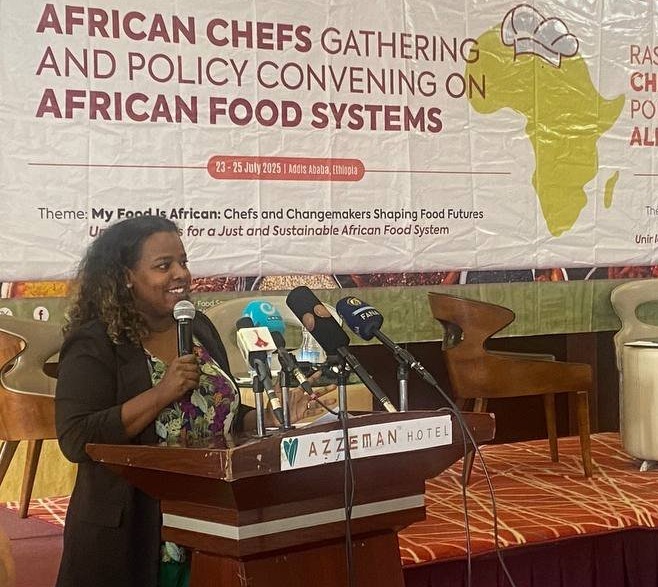Nation Working to Ensure Food Sovereignty Aligned with Climate Policy Action - ENA English
Nation Working to Ensure Food Sovereignty Aligned with Climate Policy Action

Addis Ababa, July 23, 2025 (ENA) -- Ethiopia is striving to ensure food sovereignty by aligning its food systems transformation with climate policy action, Hana Abebe, Chief of Staff and Special Advisor to the Planning and Development Minister, said.
A three-day African Chefs and policy makers gathering on African food systems that celebrate African culinary heritage and addressing food systems is opened in Addis Ababa today.
The meeting under the theme, "My Food is African: Chefs and Changemakers Shaping Food Futures" has brought together renowned chefs, policymakers, and other stakeholders across the continent.
Opening the meeting, the Chief of Staff said African food systems that nourish the people, shape culture and drive the economy are increasingly under threat from erratic rainfall, rising temperatures, land degradation and growing unpredictability of climate shocks.
Climate crisis is affecting the harvest, livestock and the very plates of families, she noted, adding that challenges also present opportunity to transform the food systems of a country into resilience, sustainability, and equity.
In this regard, the Government of Ethiopia is working on aligning food systems transformation with climate policy actions, Hana stated.
“We have been working on aligning food systems transformation with climate policy actions. This means investing in climate smart agriculture, restoring degraded lands, empowering smallholder farmers, especially women and youth, and promoting sustainable consumption.”
Above all, the Special Advisor underscored the importance of strong partnership among stakeholders to ensure food sovereignty in Africa.
Alliance for Food Sovereignty in Africa (AFSA) General Coordinator, Million Belay on his part said African food system has been facing triple burden of malnutrition: Hunger, micronutrient deficiency, and non-communicable diseases.
According to him, lack of coherent food polices environmental uncertainty, bio-diversity loss, soil degradation and social inequalities like poverty and neglect of cultural values are among the challenges facing food systems in the continent.
“Our food is everything of us, including identity and existence,” Million noted, emphasizing the importance of realizing food sovereignty with increasing the knowledge of preserving indigenous food and enacting agro-ecology policies that support agricultural diversification.
East African Legislative Assembly Committee on Agriculture, Tourism and Natural Resources Chairperson, Francoise Uwumukiza stressed the pressing need for increased investment in domestic food production and supply chains, pointing out that inadequate funding has a detrimental effect on food security across the continent.
She said current policies and legislations in Africa hinder the African support to local food and traditional knowledge, noting that the colonial legacy shaped but never sharpened the export-focused policies, neglecting local food systems and traditional knowledge.
Stressing the importance of uplifting traditional food systems, which have often been stigmatized, Uwumukiza stated that addressing the issues of malnutrition and climate change by valuing the indigenous knowledge and practices of Africa is crucial.
She urged policies that support farmers' rights, recognize traditional practices, and ensure that smallholder farmers are included in decision-making processes related to food security.
Integrating traditional knowledge into agricultural policies is not just beneficial but necessary for the sustainability and security of food systems in Africa.